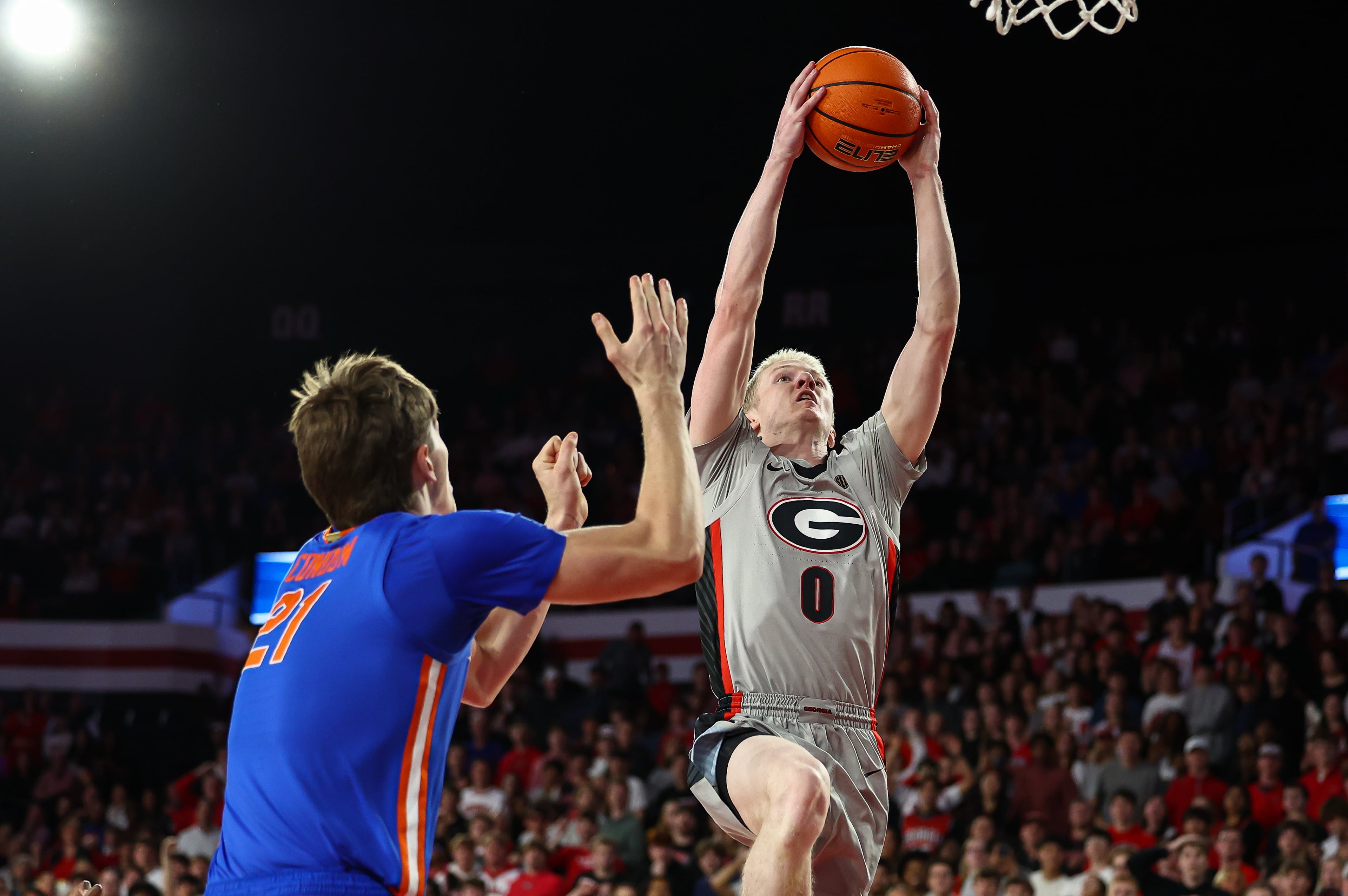Georgia baffled by its first-possession defensive breakdowns
ATHENS — It’s been somewhat humorous until now. Now it probably needs to stop.
We’re talking about the Georgia Bulldogs’ early-touchdown dilemma. As most Georgia fans can recite at this point, the Bulldogs have allowed a touchdown on their opponents’ opening possession in each of the past five games. Not coincidentally, Georgia trailed in seven of its eight SEC contests this season.
Obviously, it hasn’t held back the No. 1-ranked Bulldogs. Two-time defending national champions and winners of an SEC-record-tying 28 wins in a row, Georgia (10-0, 8-0) enters Saturday’s regular-season finale (7:30 p.m., ABC) against Georgia Tech (6-5) as a three-touchdown favorite with the expectation of completing a third consecutive undefeated regular season.
Unprecedented. Astounding. But the stakes rise from here, and playing from behind figures to become an increasingly risky proposition going forward.
“That’s something we’ve got to work on because we can’t do the things we want to do while giving up a first-drive touchdown, let alone a long first play,” junior safety Javon Bullard said.
Bullard found himself right in the middle of Georgia’s latest defensive breakdown. Tennessee, known as one of the SEC’s better rushing teams, started at its own 25 on Saturday after the Bulldogs deferred on the pregame coin toss and chose to go on defense first.
The Volunteers opened with a bread-and-butter play, a zone-read handoff from quarterback Joe Milton to running back Jaylen Wright at right guard. Wright encountered zero resistance.
Linebacker Smael Mondon, who began the play lined up over the guard gap through which Wright would come, abandoned that lane to engage with the right tackle at the line of scrimmage. Nobody filled in behind him.
Defensive end Mykel Williams and tackle Zion Logue reached wildly from the back side but couldn’t put a hand on Wright. Nickel back Tykee Smith, moving right to cover the man in motion across the formation, was not in position to make the play. Neither were cornerback Kamari Lassiter or Bullard. Equidistance from both players, Wright split those defenders without breaking stride and was gone.
“I don’t want to get into specifics, but it was a mis-fit,” Mondon said afterward.
Said Bullard: “I don’t think we were in the right play-call for the thing that they ran. But the guy, he straight-shot it. He hit it, and he was off to the races.”
Tennessee’s score was a dramatic magnification of what we’ve seen from Georgia on the opponents’ first possession over the last half of the season. The Bulldogs fell behind Vanderbilt, Florida, Missouri, Ole Miss and the Vols by the combined score of 35-3 after first possessions.
- Against Ole Miss, that first score was a 15-yard run by Quinshon Judkins 4:30 into the game.
- Against Missouri, it was a 39-yard TD pass from Brady Cook to Luther Burden.
- Against Florida, it was a 25-yard pass from Graham Mertz to Eugene Wilson.
- Against Vanderbilt, it was 49-yard pass from Ken Seals to London Humphreys.
Those teams compiled 366 yards of offense on 32 plays on those opening drives. That’s an off-the-charts average of 11.44 yards per play.
It wasn’t on the first possession, but Georgia also fell behind at Auburn 10-0 on Sept. 30 and trailed South Carolina 7-0 at Sanford Stadium following Spencer Rattler’s 17-yard TD pass 5:04 into the game.
Only Kentucky, ranked No. 20 at the time, failed to score in the first quarter on the Bulldogs. That would end as a 51-13 blowout Georgia victory.
Coach Kirby Smart and defensive coordinator Glenn Schumann are at their wits’ end about this first-possession phenomena.
“Yeah, I talked to ‘Schu’ before the game and said, ‘we’re going to let them score, so let’s go ahead and get it over with,’” Smart quipped after the 38-10 victory over the Vols.
Then his tone turned serious.
“Historically, Georgia does not give up explosive runs,” Smart said. “The secondary’s got to get the guy on the ground. We’ve got a great secondary that leverages the ball, and we take a lot of pride in that. If the ball breaks out, the most they usually get is like 20, and that didn’t happen.”
Defending the run is the biggest difference in this defense and the previous two. The Bulldogs are allowing 109.9 yards rushing per game. That number was below 80 in 2021 and ‘22.
Meanwhile, Saturday’s opponent is pretty good at toting the pigskin. The Yellow Jackets average 196.4 yards per game on the ground.
While it may be hard to recall now, Tech in the last game of the season last year in Athens was the only opponent to score a first-quarter touchdown against the Bulldogs. Georgia won that one, too, of course, outscoring them 37-7 the rest of the way.
And that’s the crazy thing about it. This season, after trailing in the first quarter of the past five games, Georgia won by an average of 24.4 points.
“In-game adjustments,” Bullard said proudly. “This group is different. These past defenses, we had one legendary defense, and last year we just felt like underdogs. This year it’s, like, you know, we don’t know what’s going on, especially on the first drive. But, like I said, we’ve mastered the in-game adjustment.”
The Bulldogs are allowing a few more points overall. They’re giving up 15.1 per game, which still ranks fifth nationally. But that’s up from 14.3 points last year and 10.2 in 2021, which led the nation.
All that really has affected is Georgia’s final margin of victory. Instead of winning by 26.8 points per game, as they did last season, the Bulldogs are winning by 25.3. The offense continues to score at a plus-40 rate (40.6 ppg) and, outside of that opening quarter, they rarely have been threatened after halftime this season.
Only Auburn, of all teams, had a realistic shot of an upset in the second half. The Tigers led 17-10 late in the third quarter and was tied 20-all inside the final three minutes.
Tech would relish such an opportunity. You can bet offensive coordinator Buster Faulkner and the Yellow Jackets’ brain trust are going to work overtime to come up with an imaginative offensive script to open play Saturday. Tech is averaging 31.9 points and 435.1 yards per game, but they’ve scored only 59 first-quarter points all season.
“They know how to attack you, where to attack you,” Smart said. “They understand it and have good backs. Same questions you have against our offense. When you have people who know what they’re doing, and they have good players doing it, they become really hard to stop. They are really good offensively.”
But if the Bulldogs stick to script and let Tech score out of the gate, they’ll have no reason to panic.



